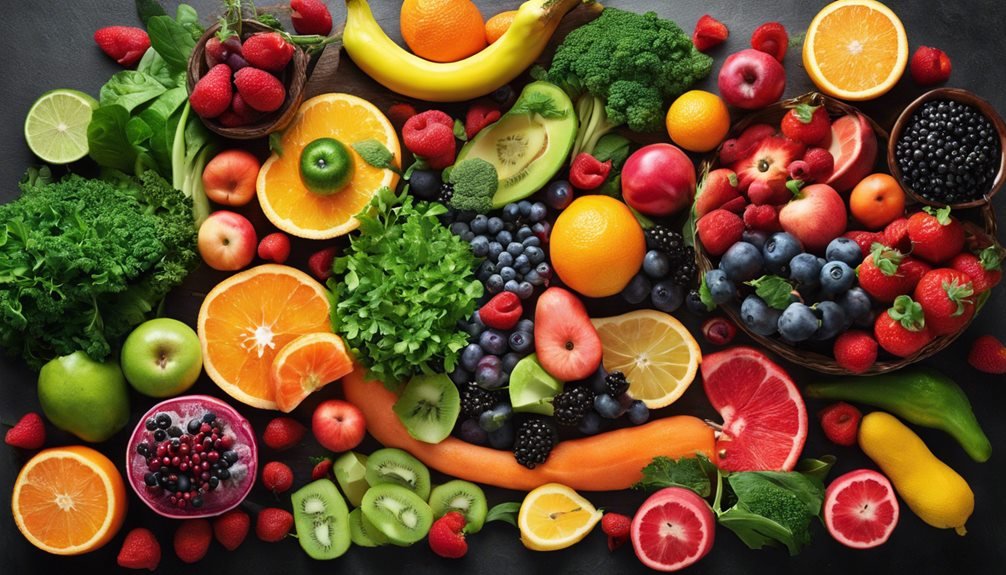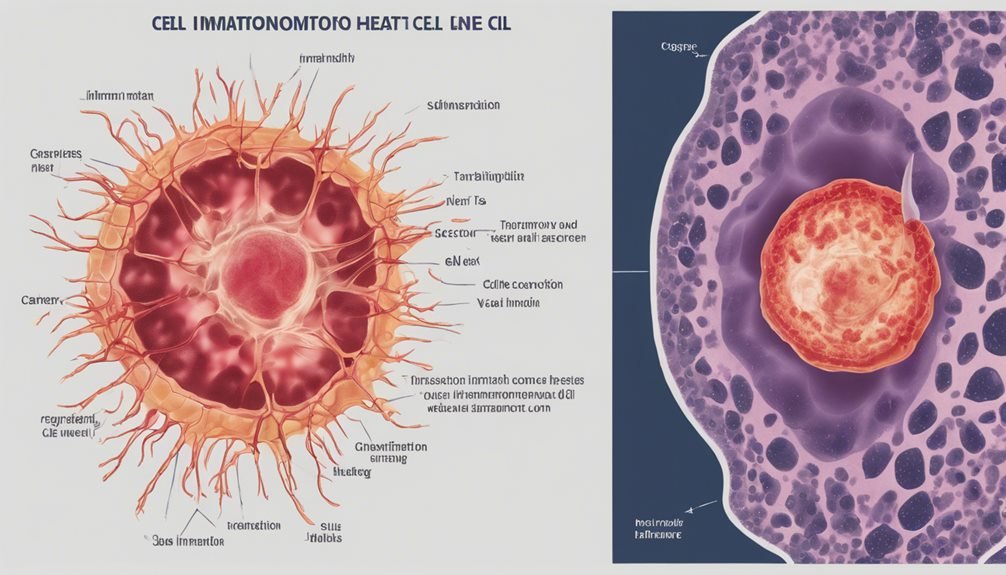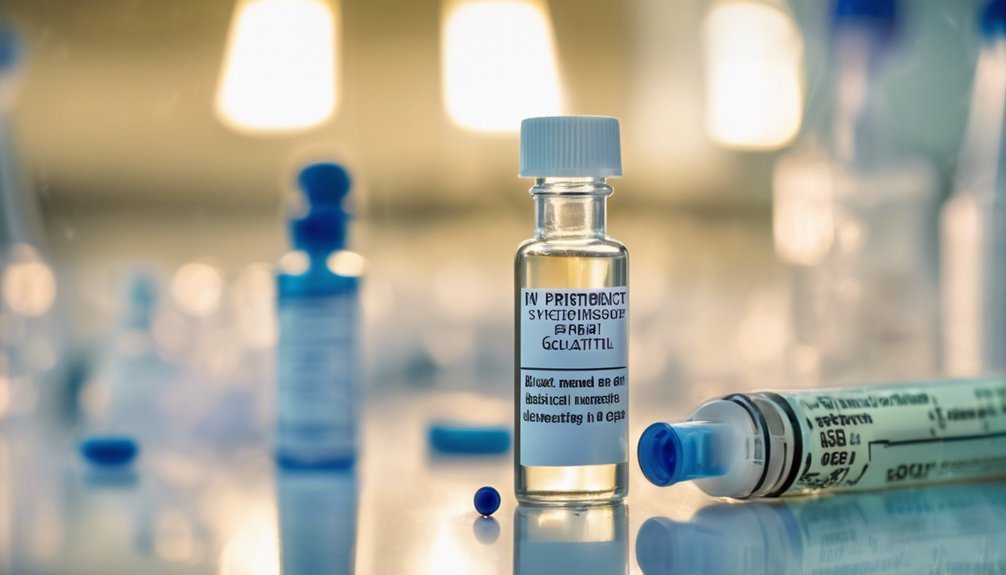When it comes to raw foods and their potential cancer-fighting benefits, the natural compounds found in uncooked and unprocessed fruits and vegetables hold promising advantages. Enzymes, antioxidants, and phytochemicals present in these raw ingredients have been linked to various protective mechanisms against cancer. But how exactly do these components interact with cancer cells, and what specific raw foods offer the most potent anti-cancer effects? Let's uncover the science behind these claims and explore how incorporating more raw foods could impact your health in a profound way.
Key Takeaways
- Raw foods contain phytochemicals and antioxidants that inhibit cancer cell growth.
- Enzymes in raw foods aid digestion and nutrient absorption for cancer prevention.
- Antioxidant-rich raw foods protect cells from DNA damage and reduce inflammation.
- Vitamin C, E, beta-carotene, and selenium in raw foods combat cancer.
- Variety of colorful fruits and vegetables in raw diet support cancer prevention.
What Are Raw Foods?
Raw foods refer to uncooked, unprocessed, and natural foods that haven't been heated above a certain temperature. The raw food diet emphasizes consuming whole, unrefined, and plant-based foods to preserve their nutritional value. Raw food preparation involves methods such as blending, juicing, soaking, sprouting, and dehydrating to maintain the enzymes and nutrients in the food. This diet encourages the intake of fruits, vegetables, nuts, seeds, and grains in their raw state to optimize the health benefits they offer.
The raw food diet is believed to provide numerous health advantages due to the preservation of essential enzymes and nutrients that can be destroyed through cooking. Enzymes are essential for digestion, and raw foods contain their natural enzymes, aiding in the digestion process. Additionally, some research suggests that a raw food diet may help reduce the risk of chronic diseases like heart disease and cancer.
Benefits of Raw Foods
When considering the benefits of incorporating raw foods into your diet, it is essential to understand the potential impact on your overall health and well-being. Raw food benefits stem from the preservation of vital nutrients that can be lost during cooking processes. By consuming raw foods, you enhance your body's ability to absorb essential vitamins, minerals, and enzymes crucial for optimal health. Additionally, a raw food diet has been linked to cancer prevention due to the abundance of phytochemicals and antioxidants present in uncooked fruits and vegetables.
| Raw Food Benefits | Nutrient Absorption |
|---|---|
| Rich in Enzymes | Enhanced |
| High in Antioxidants | Improved |
| Source of Fiber | Maximized |
| Essential Vitamins | Increased |
| Mineral-Rich | Enhanced |
Including raw foods in your daily meals can significantly impact your well-being by providing a myriad of health benefits, supporting nutrient absorption, and potentially reducing the risk of cancer.
Antioxidants in Raw Foods
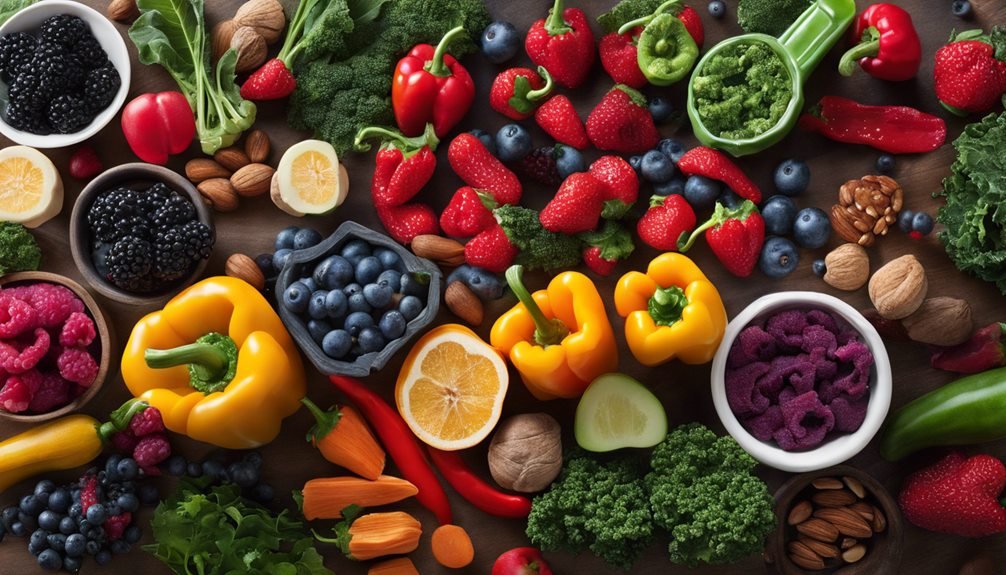
Antioxidants play a crucial role in the human body by neutralizing harmful free radicals that can contribute to oxidative stress and damage to cells. Including antioxidant-rich fruits and vegetables in your diet can be a powerful way to support your body's defense mechanisms against cancer. These natural compounds found in raw foods work by scavenging free radicals, reducing inflammation, and protecting cells from DNA damage, all of which are essential in preventing cancer development.
Research has shown that antioxidants like vitamin C, vitamin E, beta-carotene, and selenium can help combat cancer by inhibiting the growth of cancer cells and reducing the risk of tumor formation.
Foods such as berries, leafy greens, citrus fruits, and cruciferous vegetables are particularly abundant in these cancer-fighting properties. By incorporating a variety of colorful fruits and vegetables into your meals, you can harness the potent antioxidant benefits of raw foods to promote overall health and reduce the risk of cancer.
Phytochemicals and Cancer Prevention
Phytochemicals are bioactive compounds found in plants that have been extensively studied for their potential role in cancer prevention. These natural compounds have shown promising abilities to help combat cancer by protecting cells from damage, reducing inflammation, and inhibiting the growth of cancerous cells. Phytochemicals act as antioxidants, which help neutralize harmful free radicals that can lead to DNA damage and cancer development. Some well-known phytochemicals include flavonoids, carotenoids, and polyphenols, which are abundant in raw fruits, vegetables, nuts, and seeds.
Studies have suggested that a diet rich in phytochemicals may lower the risk of certain types of cancer, including breast, prostate, lung, and colorectal cancer. By incorporating a variety of colorful fruits and vegetables into your daily meals, you can increase your intake of phytochemicals and support your body's natural defense mechanisms against cancer.
Raw Vegetables and Fruits
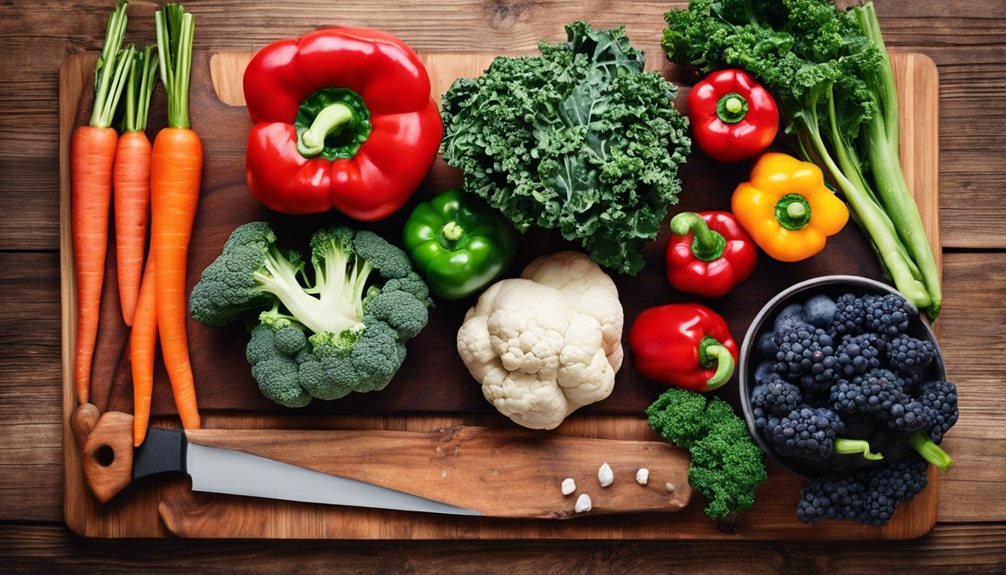
Amidst the abundance of research on cancer prevention, the consumption of raw vegetables and fruits emerges as a cornerstone of a healthful diet. Raw vegetables and fruits are packed with essential vitamins, minerals, and phytochemicals that are known to have cancer-fighting properties. Including a variety of colorful fruits and vegetables into your diet can provide a range of antioxidants that help combat oxidative stress and inflammation, both of which are linked to cancer development.
Here is a table showcasing some of the cancer-fighting nutrients found in raw vegetables and fruits:
| Nutrient | Food Sources | Benefits |
|---|---|---|
| Vitamin C | Oranges, Bell Peppers | Boosts immune system and protects cells from damage |
| Beta-Carotene | Carrots, Sweet Potatoes | Acts as an antioxidant, promoting healthy cell growth |
| Fiber | Broccoli, Berries | Aids in digestion and helps remove toxins from the body |
Incorporating raw vegetables and fruits into your diet can be delicious and simple. Try making raw smoothies or exploring raw food recipes to enjoy the maximum benefits of these cancer-fighting foods. Remember to wash all produce thoroughly to reduce the risk of foodborne illnesses.
Raw Nuts and Seeds
Raw nuts and seeds are another vital component of a cancer-fighting diet, offering a rich source of nutrients that can contribute to overall health and well-being. These nutrient powerhouses are packed with essential vitamins, minerals, healthy fats, and antioxidants that play a significant role in cancer prevention.
The nutritional value of raw nuts and seeds is impressive. They're high in protein, fiber, and various micronutrients such as vitamin E, selenium, and zinc, all of which are crucial for maintaining a strong immune system and reducing inflammation in the body.
Additionally, the healthy fats found in nuts and seeds, like omega-3 fatty acids, have been linked to lower cancer risks, especially breast and prostate cancers.
Incorporating a variety of raw nuts and seeds into your daily diet can provide a plethora of health benefits, including cancer prevention. Snack on almonds, walnuts, chia seeds, flaxseeds, or pumpkin seeds to harness their nutritional power and support your overall well-being.
Incorporating Raw Foods Daily
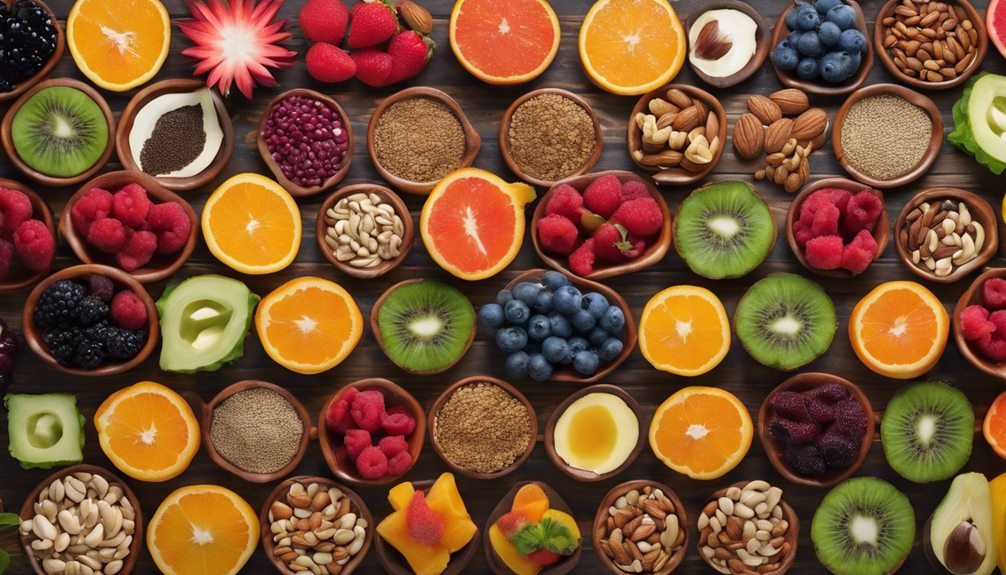
When aiming to incorporate raw foods into your daily diet, it's essential to focus on a variety of fruits, vegetables, nuts, seeds, and whole grains. Meal planning becomes crucial to ensure you're getting a balanced intake of nutrients. Plan your meals around a rainbow of colors to ensure a wide range of vitamins, minerals, and antioxidants.
For breakfast, try a smoothie bowl with blended berries, bananas, and nuts topped with chia seeds. Lunch could consist of a colorful salad with leafy greens, bell peppers, tomatoes, and a mix of seeds.
For dinner, consider a zucchini pasta with a homemade tomato sauce filled with fresh herbs. Snack on raw veggies with hummus or nut butter for a satisfying treat. Experiment with different recipe ideas to keep your meals exciting and varied.
Raw Juices for Cancer Prevention
To enhance your understanding of the potential benefits of raw juices in cancer prevention, it is important to delve into the research surrounding the consumption of nutrient-dense liquids derived from fresh fruits and vegetables. Raw juices are packed with essential vitamins, minerals, and antioxidants that play a crucial role in detoxification and weight loss, which are key factors in cancer prevention.
When considering raw juices for detoxification and weight loss, it is vital to choose a variety of fruits and vegetables to ensure a broad spectrum of nutrients. Here is a table showcasing some examples of fruits and vegetables commonly used in raw juices:
| Fruits | Vegetables | Benefits |
|---|---|---|
| Berries | Spinach | Antioxidants, iron |
| Citrus fruits | Kale | Vitamin C, calcium |
| Pineapple | Carrots | Bromelain, beta-carotene |
| Watermelon | Cucumber | Hydration, silica |
Incorporating these ingredients into your raw juices can support your body's natural detoxification processes and contribute to maintaining a healthy weight, ultimately aiding in cancer prevention.
Raw Foods and Gut Health
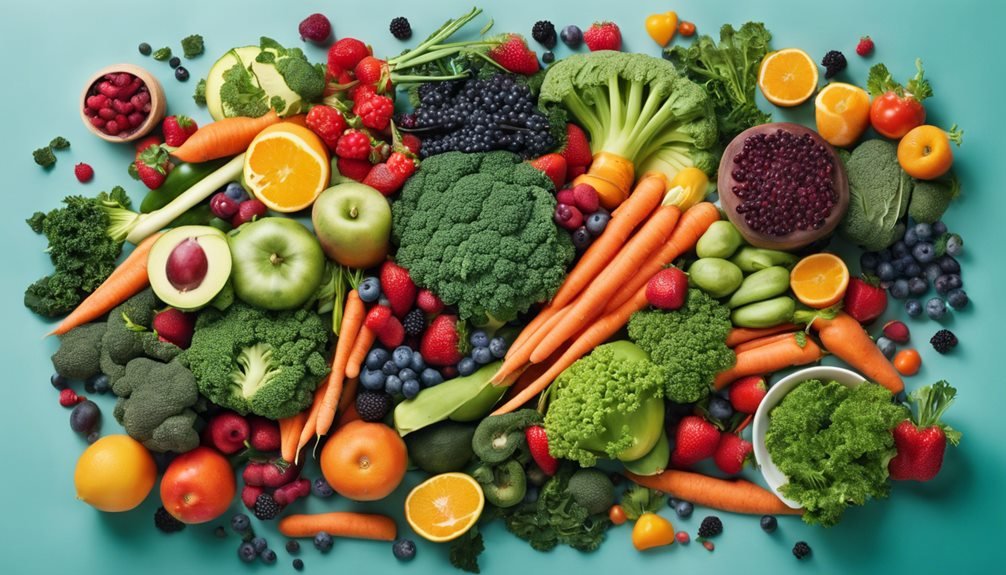
Consuming a diet rich in raw foods can significantly impact gut health by providing essential nutrients and promoting a diverse microbiome. The gut microbiome, which consists of trillions of bacteria and other microorganisms, plays a crucial role in digestion, nutrient absorption, and immune function.
Raw foods, such as fruits, vegetables, nuts, and seeds, are abundant in fiber, vitamins, and minerals that nourish the gut and support the growth of beneficial bacteria.
Additionally, raw foods are rich in digestive enzymes, which help break down food and aid in the absorption of nutrients. By including these enzymes in your diet through raw foods, you can support optimal digestion and overall gut health.
A diverse and balanced gut microbiome is essential for maintaining a healthy immune system and reducing the risk of various digestive disorders.
Incorporating raw foods into your diet can help promote a thriving gut microbiome and ensure that your digestive system functions optimally.
Raw Foods and Inflammation
Raw foods have been shown to have anti-inflammatory properties that can benefit overall health and well-being. Inflammation is a natural response by the body to protect against harmful stimuli, but chronic inflammation can lead to various diseases, including cancer. Raw foods, rich in antioxidants, phytochemicals, and enzymes, play a crucial role in reducing inflammation levels in the body.
When it comes to gut health, raw foods can have a significant impact. The gut is closely linked to the immune system and plays a key role in regulating inflammation. Raw foods, such as fruits, vegetables, nuts, and seeds, are rich in fiber and nutrients that support a healthy gut microbiome. By promoting good bacteria growth and reducing gut inflammation, raw foods help maintain a balanced immune response.
Incorporating a variety of raw foods into your diet can help combat inflammation, support gut health, and contribute to overall well-being. Consider adding more raw fruits, vegetables, and nuts to your meals to harness their anti-inflammatory benefits.
Raw Foods and Immune System

Inflammation is intricately linked to the immune system, highlighting the importance of maintaining a balanced inflammatory response for overall health. When considering raw foods and the immune system, it's crucial to understand how they can impact immune responses and nutrient absorption.
Raw foods are rich in essential nutrients like vitamins, minerals, and antioxidants, which play a vital role in supporting a healthy immune system. These nutrients help in strengthening the immune response, making it more effective at fighting off infections and diseases.
Additionally, raw foods retain their natural enzymes, which aid in proper digestion and nutrient absorption. Proper nutrient absorption is essential for optimal immune function as various vitamins and minerals are necessary for the immune system to function correctly.
Precautions When Consuming Raw Foods
When incorporating raw foods into your diet, it's essential to be mindful of potential risks and precautions associated with their consumption. Food safety is paramount when consuming raw foods to prevent foodborne illnesses caused by harmful bacteria like E. coli and Salmonella. To reduce these risks, ensure proper washing of fruits and vegetables, and consider buying organic produce. Additionally, be cautious with raw animal products like eggs, meats, and seafood, as they pose a higher risk of contamination.
Furthermore, raw foods contain natural enzymes that aid in digestion and nutrient absorption. However, cooking can sometimes make certain foods easier to digest. If you have a sensitive digestive system, gradually introduce raw foods into your diet to allow your body to adjust. Pay attention to how your body responds and make adjustments accordingly.
Frequently Asked Questions
Can Raw Foods Be Harmful if Not Prepared Correctly?
If not prepared correctly, raw foods can indeed be harmful. It's crucial to follow food safety precautions and proper food handling techniques to prevent foodborne illnesses.
Contaminated raw foods can harbor harmful bacteria like E. coli or Salmonella if not handled properly. Ensuring proper washing, storage, and cooking of raw foods can greatly reduce the risk of foodborne illnesses and promote overall health and well-being.
Are There Any Raw Foods to Avoid for Cancer Prevention?
To prevent cancer, avoid raw foods prone to contamination, like unpasteurized dairy, raw eggs, and sprouts. These can harbor harmful bacteria, increasing infection risks.
Raw food safety is crucial in cancer prevention as these contaminants may weaken the immune system, making it harder to fight cancer cells. Be cautious with raw food choices to reduce exposure to potential carcinogens and prioritize food safety practices for overall health benefits.
How Can I Ensure I Am Getting Enough Protein From Raw Foods?
To ensure adequate protein intake from raw foods, focus on protein sources like nuts, seeds, legumes, and leafy greens.
Optimize nutrient absorption by diversifying your raw food choices to cover essential amino acids.
Incorporate a variety of plant-based proteins to meet your daily requirements and support overall health.
Pairing complementary protein sources can help you achieve a balanced amino acid profile needed for optimal protein synthesis and bodily functions.
Can Raw Foods Help With Weight Loss and Management?
To manage weight, raw foods can be beneficial due to their low calorie density and high fiber content.
Raw food detoxification methods often emphasize plant-based whole foods, which can aid in weight loss by promoting satiety and reducing overall caloric intake.
Incorporating various raw food recipes can add variety to your diet while supporting a healthy weight management plan.
Are There Specific Raw Foods That Can Boost Energy Levels?
To boost energy levels with raw foods, focus on raw food desserts, energy-boosting smoothies, raw food snacks, and superfood salads. These options are rich in essential nutrients, enzymes, and antioxidants that can support sustained energy throughout the day.
Incorporating a variety of raw foods can provide a balanced source of vitamins, minerals, and fiber, promoting overall well-being and vitality. Experiment with different combinations to find what works best for you.
Conclusion
Incorporating a rainbow of raw foods into your diet is like giving your body an armor against cancer. The powerful antioxidants, phytochemicals, and nutrients found in these unprocessed gems work together to defend your cells, reduce inflammation, and boost your immune system. So, next time you reach for a snack, choose a colorful array of raw fruits and vegetables to nourish your body and fight off cancer-causing agents. Your health will thank you!
